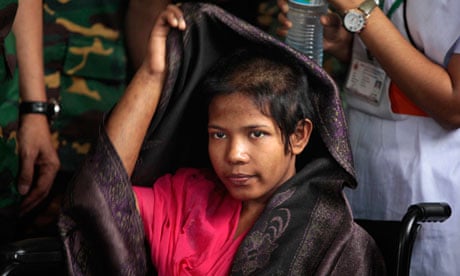Some of the world's biggest fashion chains, including H&M, Zara, C&A, Tesco and Primark, have signed up to a legally binding agreement to help finance fire safety and building improvements in the factories they use in Bangladesh.
The move came on Monday, as the Bangladeshi government agreed to allow the country's four million garment workers to form trade unions without permission from factory owners, a major concession to campaigners lobbying for widespread reforms to the industry following the collapse of the Rana Plaza building last month that killed more than 1,100 people.
On Sunday, the government also announced a plan to raise the minimum wage for garment workers, who are paid some of the lowest wages in the world to sew clothing bound for global retailers. Those working at the eight-storey Rana Plaza, which housed five garment factories when it collapsed on 24 April, were paid as little as £25 ($38) a month.
"I believe labour should be justly appraised. We want to save the industry but at the same time we want to uplift the standard of living of our workers. We do not want slave labour," Abdul Latif Siddiqui, minister for textiles, told the Guardian.
Several major western firms have now signed up to a legally binding accord agreed by local labour organisations that aims to ensure basic standards of workplace safety in the 5,000 or more garment factories in Bangladesh after widespread criticism of international firms working with local garment producers in one of Asia's poorest countries.
The Swedish company H&M buys more clothes from Bangladesh than anyone else and said it hoped other retailers would sign up to the agreement, which aims to make mandatory independent factory safety inspections, public reports, and repairs and renovations.
A spokesman said H&M hoped to create an environment "in which no worker needs to fear fires, building collapses or other accidents that could be prevented with reasonable health and safety measures".
Spanish firm Inditex, parent company of Zara and the biggest fashion retailer in the world, added its support to the deal.
Primark, one of the key customers at the collapsed building, became the first UK retailer to sign up, having originally refused to sign up to a similar agreement, saying it would prefer to work with the Ethical Trading Initiative on a different proposal.
A spokesman for the firm said: "This accord is substantively different to the version originally proposed, and as a result Primark has been able to sign it."
C&A, which also used the factory, has also signed up to the agreement.
The death toll from the collapse, the world's worst industrial accident since the Bhopal disaster in India in 1984, now stands at 1,127.
Rescuers on Monday continued to search for survivors after a woman was discovered alive under the rubble on Friday. Reshma Begum is now recovering in hospital and on Monday vowed never to work in a garment factory again.
But no further bodies were found at the site, in the Dhaka suburb of Savar, indicating that all may now have been retrieved, a spokesman for the army, which is co-ordinating the salvage operation, said.
Mosharraf Hossain Bhuiyan, a government spokesman, said ministers had agreed to amend the law to lift legal restrictions on forming trade unions in most industries.
"No such permission from owners is now needed," Bhuiyan told reporters after the meeting presided over by the prime minister, Sheikh Hasina. "The government is doing it for the welfare of the workers."
Local and international trade unions have long argued for such changes. Writing in Monday's Guardian, Prof Muhammad Yunus, the Nobel laureate and internationally respected social activist who pioneered microfinance, called for both a minimum wage and a 50 cent (33p) surcharge on garments made in Bangladesh which would finance a social welfare fund assuring safety at work, health care and pensions for workers.
On Sunday, the government set up a new minimum wage board that will issue recommendations for pay raises within three months, the textiles minister, said.
The new wage board will include representatives of factory owners, workers and the government, he said.
Abdus Salam Murshedy, former president of Bangladesh Garment Manufacturers and Exporters Association, said owners welcomed the move which campaigners said was long overdue. Activists are demanding a minimum monthly wage of 8,000 takas, or £67.
"The standard of living has become much more expensive than it was two years ago. The cost of essential items, house rents and utilities are very high in and around Dhaka," said Mushrefa Mishu, president of Garment Workers' Unity Forum.
Yunus, founder of the microfinance pioneer Grameen bank, said the garment industry had brought many benefits to Bangladesh, one of the poorest countries in Asia, but should be reformed.
Bangladesh is the third-biggest exporter of clothes in the world after China and Italy. The industry has allowed millions of women from poor rural backgrounds to earn a living. However minimum wages for garment workers were last raised by 80% to 3,000 takas (£25) a month in 2010 following protests by workers.
Since 2005, at least 1,800 garment workers have been killed in factory fires and building collapses in Bangladesh, according to research by the advocacy group International Labour Rights Forum.
In November, 112 workers were killed in a garment factory in Dhaka. The factory lacked emergency exits, and its owner said only three of the eight-story building were built legally.
Endemic corruptions means owners and constructors can routinely ignore health and safety regulations.
The owner of the Rana Plaza and eight other people, including garment factory owners, have been detained. Authorities say the building owner added floors to the structure illegally and allowed the factories to install heavy equipment such as generators that the building was not designed to support.
